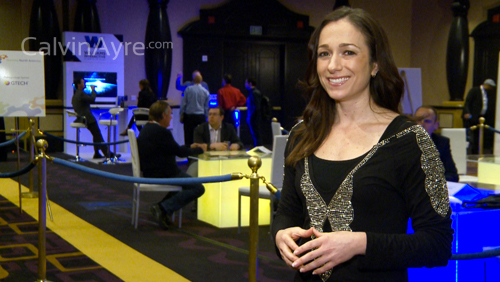
The second day of iGaming North America was busy and bustling, with a steady stream of delegates popping in and out throughout the day despite the fact that March Madness has kicked off here in Las Vegas.
Today was an incredibly full day with several session tracks running simultaneously and focuses spanning from social gaming to operations to niche markets to online poker and iGaming 101. In between the sessions, delegates had the opportunity to network and browse booths during breaks throughout the day and attend meet-ups during lunch if they wished.
A unique feature of the day two schedule was the “As close as you ever want to get to a federally prosecuted sports betting trial” session arranged by Ifrah Law and graced by a member of the DOJ. To keep the crowd engaged, the trial was light hearted and fun, with one of Jeff Ifrah’s associates playing the part of “Ginger” the defendant (for those who have seen American Hustle, think Jennifer Lawrence’s character) and as Sue Schneider pointed out, she gave an “Academy Award performance”. In their line of questioning, Ifrah and his Partner David Deitch grilled “Ginger” with questions intended to give the crowd a better understanding of the issues at hand in the courts when it comes to sports betting in America.
One of the takeaways from the trial is that the laws regarding sports betting in America are pretty ridiculous, but it is what it is and thankfully there is some hope, especially for states like New Jersey who wish to bring sports betting to the Atlantic City casinos. Ifrah predicted that eventually we’ll see casinos outside of those exempt from the Professional and Amateur Sports Protection Act (PAPSA) start to legally offer sports gambling and within five or six years of that, online offerings will follow.
Another topic covered today in the panels was the current challenges that come along with payment processing in the US regulated online gambling markets, namely that the banks are still quite weary to process online gambling transactions. Gamblers within Nevada, New Jersey and Delaware are still having difficulties getting their money in the system regardless of the fact that online gambling is completely accepted by the governments in their respective states.
Matt Katz of CAMS explained that the key is education- we must educate the banks on online gambling transactions and even bring the operators together to offer the banks one unified solution. The banks simply do not have a comfort level yet with online gambling and until that happens, the industry will have to look for ways to work around the hurdles.
Katz confirmed that using MasterCard over Visa yields a much higher success rate and using ACH transactions are good backup if credit cards do not work. Katz’s advice to operators working within the US regulated markets is that they clearly mark on the payments page what banks are gambling friendly, which are not, what credit card to use and other tips so make the process as smooth as possible. When asked what to say to those customers who are living close to the border and denied access due to faulty geo-location issues, he smiled and answered with, “Bear with us.”
The afternoon of day two featured several panels addressing US regulated online poker and how things are going so far in Nevada and New Jersey for sites such as Ultimate Poker and WSOP.com.
When examining the market in Nevada, an interesting takeaway is that a good number of players in Nevada will be pros and therefore the market is skewed. Panelist Dan Stewart of PokerScout.com said there are a “disproportionate number of serious, high volume players” in Nevada, and unlike the recreational player, they will take money out of the system. Fellow panelist WSOP.com’s Bill Rini agreed and added that visitors coming to Las Vegas from outside the state will likely not play online poker while they are in town as there are so many other things to do rather than sit on a computer.
When examining the market in New Jersey, the panelists agreed that Party Poker/Borgata has been the most aggressive, especially with the tournament offerings. Stewart highlighted that have three US regulated online poker sites in the state is approaching saturation although there may be room for a fourth. Rini added that the banks are moving very slowly and that the operators must educate the banks, have meetings with them and keep an open dialogue with them to keep the money flowing.
It will also be interesting to see how the upcoming WSOP in Las Vegas will affect the online poker market in Nevada, with all panelists predicting there will be an uptick considering the additional poker fanatics in town and the WSOP promotions that the sites will be offering.
During that same panel the question was posed, “why would players choose to play on (US) regulated sites vs. (internationally regulated) sites with more liquidity?”
In reality, there are international companies that have international licenses and offer services to Americans, sites that have been around for years and have access to much more liquidity- that is true. Why players would choose to play at sites regulated in America such as Ultimate Poker and WSOP over the international options, that is the real question. The answers from the panelists were talked about credibility and security of funds but no matter what we think, it’s really just down to the players to make the choice for themselves.
Also, don’t forget to check out iGaming North America Day 1 and Day 3 Recap Videos.
